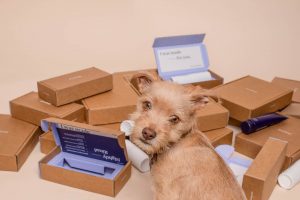Unfortunately, dogs can become intoxicated by swallowing antifreeze. This product, which can be found in most garages, is a little sweet and attracts greedy dogs. What are the signs of poisoning and the health risks for the dog? How to react if this happens to you?
Ethylene glycol and propylene glycol, two antifreeze substances dangerous for dogs
Ethylene glycol and propylene glycol are two everyday household products.
The former is found in automotive radiator coolants, heating or air conditioning water pipes where it is used as an antifreeze additive, and certain cleaning products.
The second is also used as an antifreeze, but it is also found in the vaping liquids of electronic cigarettes and smaller quantities in cosmetics and food products.
Both of these products are toxic to dogs if they accidentally swallow them. Note that some dogs may be particularly attracted to ethylene glycol because of its sweet taste.
Signs of dog antifreeze poisoning
If a dog accidentally swallows a product containing ethylene glycol, the first signs of poisoning may appear within 30 minutes to 5 hours of ingestion. Symptoms of poisoning are:
digestive: diarrhoea, vomiting, intense thirst,
nervous: depression, gait disturbances and uncoordinated movements, the appearance of rapid and involuntary muscle contractions, partial loss of motor skills and in the most severe cases: coma,
Cardiac and Pulmonary: Heart rate and respiratory rate increase first, followed by slowing heart rate and respiratory rate second.
The animal may also develop acute renal failure due to the deposition of calcium oxalate crystals in the kidneys resulting from the metabolism of the toxicant by the liver. This renal failure appears after 1 or 2 days of apparent recovery of the dog and leads irreparably to his death.
If the dog has become poisoned with propylene glycol, the signs of poisoning are:
diarrhoea,
neurological disorders: sleep, depression.
a decrease in the respiratory rate,
cardiovascular disorders,
polyuropolydipsia (drinking and urinating more),
destruction of red blood cells,
Please note!
Propylene glycol poisoning can also be chronic: taking small doses (which may be present in food, for example) each day.
What to do if a dog has swallowed antifreeze
If your dog has swallowed products containing ethylene glycol or propylene glycol, it is imperative to call your veterinarian or, failing that, a veterinary poison control centre without delay.
In either case, the veterinarian will treat the symptoms of the poisoning and support the dog’s vital functions. There is a specific antidote, ethanol, for ethylene glycol, but it is only effective when given very soon after ingestion.





